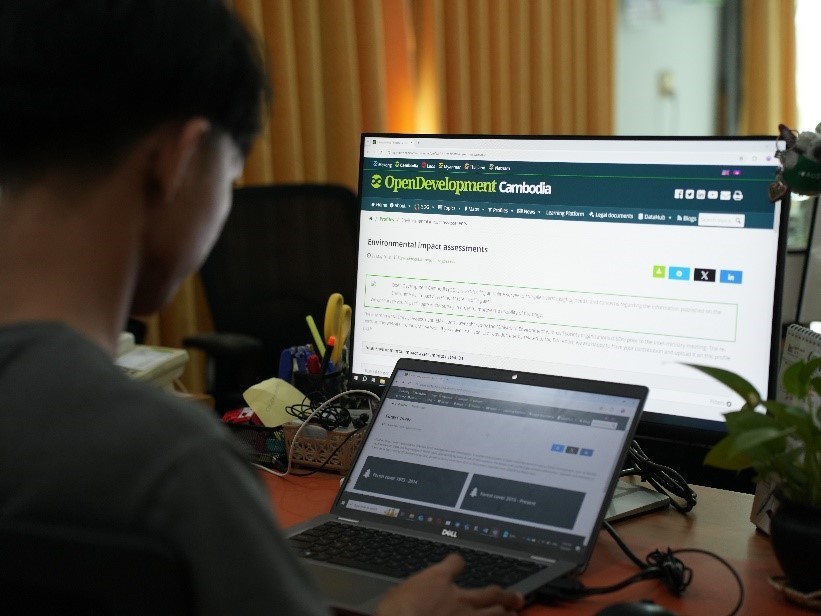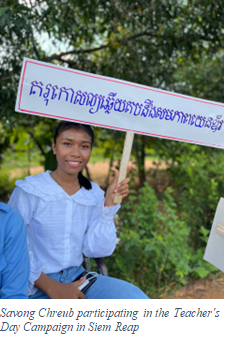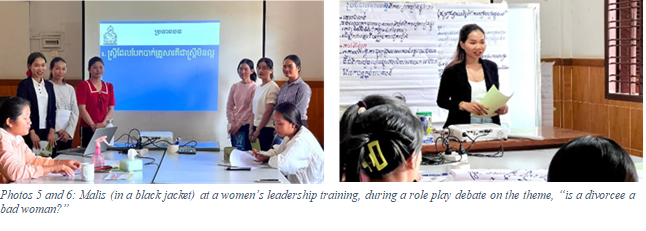To improve access to meaningful and reliable natural resource management (NRM) and environmental protection data, ODC has taken a significant initiative to ensure the availability of Environmental Impact Assessment (EIA) reports. Providing the public with EIA reports is critical to ensuring transparency, accountability, and informed decision-making. It enables the public to understand the potential environmental consequences of proposed projects and hold decision-makers accountable. The public’s access to this information promotes informed debate, ensures that all stakeholders’ voices are heard, and supports the prevention of environmentally harmful projects. This transparency fosters trust among the government, industry, and the community, resulting in improved environmental outcomes. This will help the relevant stakeholders and community to monitor the project implementation. However, the advocacy for disclosure poses substantial challenges.

As a first step, ODC organized a series of workshops on the disclosure of environmental data, specifically EIA reports. These workshops were attended by CSOs, the Ministry of Environment’s EIA Department, and other stakeholders. During these sessions, ODC emphasized the importance of making EIA reports public and encouraged collaboration to achieve this transparency. In addition to the workshops, ODC wrote several official letters to the MoE and partners, urging them to release the EIA reports. This advocacy was addressed through both formal and informal settings.
Despite the government’s initial stance of “No Disclosure,” there was one notable development: ODC was able to find alternative locations where environmental data and reports are stored. While direct requests to the government for EIA report disclosure have yet to make results, ODC identified an alternative approach, i.e., that CSOs with access to EIA reports can share them. Through numerous discussions and advocacy efforts, ODC raised critical questions, including, “Why can’t these reports be shared when regulations require their disclosure?” Furthermore, “Why aren’t the CSOs sharing the reports they have?”
ODC continued to lobby key stakeholders through discussions, official requests, and workshops. These persistent efforts, supported by USAID through CSS, returned a significant breakthrough: an agreement to share more than 90 draft EIA reports from the Development and Partnership in Action Organization (DPA). Most of these reports focus on major projects in the extractive industrial sector that interest researchers, advocates, journalists, and CSOs.
Similar Stories
Empowering education: A journey to promote gender-responsiveness in teaching through public campaigns
Coming from a lower-middle income family residing in a small village in northwest part of Cambodia, Siem Reap, 25-year old Savong Chreub is now a sophomore attending a university in her hometown. She is one of the two members in the family who is pursuing higher education. Having the opportunity for higher education is not common among low-income families who struggle to make ends meet, where girls will be mostly to be pulled out from school to help the family earn a living. Chreub is a bright and enthusiastic young woman. Not only is she dedicated to her studies, but she also volunteers passionately for the NGO. As the second child in her family to pursue higher education, Chreub is determined to break the barriers that hold back many in her community. Despite being one of five siblings, she is determined to pave her own path and achieve her dreams. Her journey towards becoming an Education Champion, youth-led social media advocator, began at a Siem Reap Education Support Team (SEST) quarterly meeting where the discussion centered on education issues, particularly focusing on teaching methods. It was there that Chreub\'s eyes were opened to the concept of gender responsiveness in teaching. She couldn\'t help but reflect on the shortcomings she had observed in the education system. Gender responsiveness was lacking in the teaching methods and there clearly were inequalities within the classroom. \"When I was in high school, a teacher mocked me for not performing well in the classroom. I acknowledge that I may not be the smartest learner. However, instead of making fun of me in front of the class, she should have given more support and attention to me in her lessons,\" she expressed. She emphasized that \"teachers should try to understand the needs and support students without judgement regardless of gender, background, race, or capability.\" Additionally, she observed her classmates have been called mean names based on their sexual orientations or class performance. Chreub joined the NGO Education Partnership (NEP) as an Education Champion, leveraging social media to advocate for gender responsiveness in teaching and learning. Despite facing initial difficulties due to her limited knowledge beyond personal experience, she dedicated hours to learning from education policies, strategic plans, research papers, and reports. She knew that to effectively advocate for change, she needed to have a strong understanding of the issues at hand. For three months straight, Chreub actively created content on social media, raising awareness about the importance of gender-responsive teaching. Her passion and commitment led her to actively participate in discussions with SEST members during quarterly meetings and other educational events. Chreub acknowledged that the issue might not be fully addressed yet, but her efforts haven\'t gone unnoticed. Teachers and friends began to pay attention. They engaged with her social media campaign, seeking to learn more about gender-responsive teaching. Additionally, Chreub finds joy in echoing the concerns surrounding this issue. She believes it has a profound impact on students, constraining their ability to unlock their full potential. As part of its main objectives of building up education stakeholders’ capacity in advocacy efforts, the youth engagement activity that Chreub has enthusiastically led has incorporated more perspectives of gender related issues in education and how youth could start taking part in tackling challenges that affect them. NEP\'s implementation of \"Promoting access to quality and inclusive education for all through public advocacy campaigns\" encourages youth like Chreub to advocate for change in education, promoting equality and quality education for all. Chreub\'s journey exemplifies the power of a single voice in initiating conversations and driving positive change in the area of education.
Pride Champions
KUY SovannChai, 17, is a student at General Education and Technical High School in Siem Reap province. Sovannchai became a member of Pride Corner’s core team after he participated in SOGIESC training conducted by Love in Diversity (LID) on August 30-31, 2023. Being a part of the core team, he frequently shares his knowledge to acquaintances about LGBTQI+ and SOGIESC in order for them to gain better understanding. Sovannchai believes that this is valuable information worth learning and spreading. He expressed satisfaction that CSS, through KYA, established a Pride Corner at his school. He believes that the Pride Corner serves as an exceptional place for fostering information dissemination and discussion related to LGBTQI+ issues. In addition, Sovannchai applied the knowledge he gained during the training session to participate in an essay competition focused on respect for LGBTQI+ rights and eliminating discrimination. As a result of his efforts, his essay was one of the top ten essays received. The competition was organized by KYA leading up to the Angkor Youth Camp. In contrast to Sovannchai, HEUN Chanmakara, 22, wasn’t always in agreement with the concept of LGBTQI+. His perception changed following his experience of volunteering with the organizing team for the 9th AYC. Prior to the camp, Makara openly expressed his disapproval of LGBTQI+ individuals during his guest appearance in KYA’s “I Know We Know” podcast. He perceived individuals identified as LGBTQI+ as abnormal and admitted to discriminating against them by avoiding any interaction with them. Taking part in AYC changed Makara’s mindset when it comes to LGBTQI+ and SOGIESC. Makara expressed that he understands these concepts better than ever before. “If a friend confides in me about their identity as an LGBTQI+ individual in future, they can rest assured that they have a supportive ally who will never discriminate against them”, said Makara. Similar to Makara, PREM Neth, 19, wasn’t always very familiar with the topic of LGBTQI+ or SOGIESC. After joining the same training that Sovannchai did with KYA and LID, Neth’s view was expanded. Neth shared that it was her first training about the topic and she, along with other students, gained lots of insights from the training, especially various struggles and challenges faced by LGBTQI+ people. Neth said: “I used to call names to my gay friends making fun of them. I didn’t think that the name calling was hurtful and affected their feelings. It was a mistake that I regret.” “I have since apologized to them and stopped calling them names. I also encouraged other friends to follow my footsteps as well,” Neth added. Neth’s story serves as a great example of how a bit of open-mindedness goes a long way. Not only did she change her own mindset, but she is determined to help changing others,’ including those of her own family. Neth expressed that her participation in KYA’s activities met with a lot of questions at first from her parents, but after taking time to explain to them, her parents approved of her involvement with KYA’s activities. PREM Neth is one of KYA’s core members who often participated in KYA’s activities, including sharing sessions
Breaking chains: A woman’s journey from a violent trap to freedom
Mrs. LEV Malis, 27, from Pouk District, Siem Reap Province was married to a violent and cheating man for seven years, with whom she had two children. Mrs. Malis got depressed and did not dare to go out or face the problem. Sometimes she considered ending her life. She had no one listen to her or be her peer support but was instead blamed by her parents for not being patient enough to be a good woman. One day, Malis met a leader of Community Based Organization (CBO), Mrs. Tep Mey, who gave her advice and referred her to the Banteay Srei Organization, which provides support to women who are victims of domestic violence. Through the support of Banteay Srei, Malis embarked on a new journey of hope, confidence, and be able to live free from violence. She left her husband, taking her two children with her, and is seeking a divorce, a decision that requires her to overcome many challenges, including social norms that frown on divorce and a difficult legal process. On September 14, 2022, Malis decided to become a volunteer for Banteay Srei. She attended her first training courses on leadership, self-awareness and facilitation skills and then joined many other workshops about gender-based violence, sexual harassment, abuse and other topics. After attending training workshops and meetings, she gained courage, and shared some of her life experiences, including how she built her self-esteem and self-motivation. In December 2022, she had gained enough confidence to be a guest speaker in the 16-day Campaign to discuss the topic “End Violence Against Women.” In early 2023, Malis started her own small business in Pouk Market, Siem Reap Province. Her business provides enough income to take care of her two children. She was inspired to share her good business start-up experience, including using digital technology and online marketing, with other women leaders at the Women Leadership Forum in April 2023.


